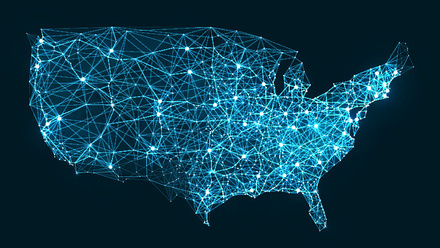AI Safety and Security
Innovation in AI, particularly Generative AI, is developing rapidly, with daily news stories highlighting the opportunities and risks. Ensuring AI safety and security is now a priority for government, civil society, and industry alike.
techUK's AI Safety program focuses on supporting members to navigate the AI safety landscape as international agreements and initiatives are operationalised. A key program priority is understanding the ambitions and progress of the UK's AISI and the wider AI safety and security discourse, particularly the role of standards. The program facilitates industry engagement and collaboration with UK stakeholders including the AISI. It also ensures the voice of UK industry on AI safety is included in this increasingly global conversation, such as at the G7 and future AI Summits.
Resources for members
We will continue to update this page with further articles, use cases and other relevant content to help inform and build on the AI Safety and Security discourse. If you’d like to contribute, please get in touch with [email protected].
Inside the AI Action Summit: techUK's Daily Updates and the Key Outcomes from Paris
The AI Action Summit in Paris, co-chaired by France and India, represented a pivotal moment in shaping the future of AI governance and development. Taking place from February 6-11, 2025 in Paris, this international gathering brought together nearly a hundred countries and over a thousand stakeholders from the private sector and civil society. You can read techUK's daily updates from the ground here and review key outcomes of the AI Action Summit here.
Building on the Bletchley Park and Seoul summits, the Paris AI Summit addressed three key challenges: accelerating global AI development and adoption across all nations, managing the AI transition while protecting individual freedoms and ensuring inclusivity, and aligning AI with humanist values to direct it toward collective benefit and public interest. The summit's structure reflected an action-oriented approach, featuring specialised tracks on the future of work, trustworthy AI, public interest applications, innovation and culture, and global governance.
More than 800 participants across five continents contributed to working groups in the months leading up to the summit to ensure diverse perspectives were accounted for. The initiative at the Summit extended beyond traditional stakeholders, with 50 innovative projects being selected worldwide to demonstrate AI applications for sustainable development goals.
It was great to learn more about the AI Action Summit through a pre-engagement with DSIT and AI Fringe on 4 February from 10:00 to 11:00. During this webinar members had the opportunity to engage directly with officials through a dedicated Q&A and feedback session, ensuring the UK tech industry's perspectives were heard ahead of this significant global dialogue. You can read more about what we expected from the AI Action Summit here.
Reflecting on the AI Seoul Summit
On 21-22 May 2024, six months after the historic Bletchley Summit hosted by the UK, the international community convened virtually and in South Korea for the AI Seoul Summit to build on the momentum and further global cooperation on AI Safety, Innovation and Inclusion. The two-day summit brought together leaders from governments, industry, civil society, and academia to discuss the responsible development and deployment of frontier AI.
Ahead of the AI Seoul Summit, on 14 May 2024 techUK welcomed Secretary of State for Science, Innovation and Technology Michelle Donelan MP at an industry event focused on bringing different voices to discuss their expectations and hopes for the upcoming AI Seoul Summit.
With over 50 senior representatives from businesses across the techUK membership, the event served as a platform for direct engagement with the UK Government, setting the stage for the forthcoming global summit set to take place in Seoul on May 21-22.
The AI Seoul Summit reaffirmed the international community's commitment to shaping the trajectory of AI development through global cooperation and shared guidelines, setting the stage for continued dialogue and concerted action in the months ahead on the road to the France Summit. This insight outlines the key outcomes of the AI Seoul Summit.
These use cases are categorised by the themes of the AI Seoul Summit, namely AI safety, innovation and inclusivity.
Reflecting on the Bletchley AI Safety Summit
The first global AI Safety Summit in the UK in 2023 facilitated consensus on approaching frontier AI technologies and established a new track in global AI discussions. The Summit took place on the 1-2 November in Bletchley Park with five key objectives, including developing a shared understanding of the risks posed by frontier AI, agreeing areas for potential collaboration on AI safety research and showcasing how the safe development of AI can enable AI to be used for good globally. It emphasised governments and industry collaborating to understand and mitigate risks of emerging AI while seizing opportunities.
The techUK perspective
techUK CEO Julian David attended the AI Safety Summit. He has provided his perspectives and reflections on the event in a one-on-one conversation with our Head of Data Analytics, AI, and Digital ID, Katherine Holden:
Discussions
A responsible approach to seizing the opportunities of AI was the thread that ran through the Summit with world leaders focusing in on how to enable humanity to seize the seismic opportunities of artificial intelligence by first seeking to understand and mitigate the potential risks of powerful emerging frontier AI technologies.
This approach was also clear in the Summit’s outcomes and Prime Minister Rishi Sunak will be pleased to have secured broad international agreement, including the US, China and EU all sharing a stage together as well as commitments from the leading developers of frontier AI technologies.
Outcomes of the Bletchley AI Safety Summit
Outcomes
So what were the key outcomes of the inaugural Global AI Safety Summit:
-
The Bletchley Declaration: signed by 28 countries, including the USA, China and European Union the Bletchley Declaration recognises that if the opportunities of AI are to be seized there must be an international effort to research, understand and mitigate the risks posed by frontier AI technologies.
-
More AI Safety Summits: the Bletchley Declaration confirmed additional meetings in 2024 with South Korea to host a mini virtual summit in six months while France will host the next full in person AI Safety Summit 12 months from now.
-
AI Safety Institute: The UK announced that it will put its Frontier Models Taskforce on a permanent footing in the form of a New AI Safety Institute creating a UK based but internationally facing resource with the purpose of evaluating frontier systems, advancing research on AI Safety and sharing information between a global network of Government’s, private companies and civil society organisations. The Institute was announced alongside endorsements from the US, Singaporean, German, Canadian and Japanese Governments as well as from major frontier AI labs.
-
Senior government representatives from leading AI nations, and major AI organisations, agreed to a plan for safety testing of frontier AI models: The plan involves testing models both pre- and post-deployment, and a role for governments in testing, particularly for critical national security, safety and society harms.
-
The UK unites with global partners to accelerate development in world’s poorest countries using AI: UK and partners to fund safe and responsible AI projects for development around the world, beginning in Africa, with £80 million collaboration.
-
Investment in the ‘AI Research Resource’ for the AI Safety Institute: The investment into the AI Research Resource has been tripled to £300 million, up from £100 million (announced in March 2023), in a bid to further boost UK AI capabilities. The investment will connect Isambard-AI (based at Bristol University) to a newly announced Cambridge supercomputer called ‘Dawn’. Connecting these two supercomputers will give researchers access to resources with more than 30-times the capacity of the UK’s current largest public AI computing tools.
Overall, both Rishi Sunak and Michelle Donelan, the Science and Technology Secretary, who led the first day of the summit, will be happy with what the UK has achieved. Securing a consensus on a process for approaching frontier AI technologies and establishing a new track in global AI discussions.
However, as always, the proof will be in how these initial agreements and forums develop in the years ahead and if they can lead to tangible progress between countries who often have differing views.
AI and Data Analytics updates
Sign-up to our monthly newsletter to get the latest updates and opportunities from our AI and Data Analytics Programme straight to your inbox.

Tess Buckley
Tess is a digital ethicist and musician. After completing a MA in AI and Philosophy, with a focus on ableism in biotechnologies, she worked as an AI Ethics Analyst with a dataset on corporate digital responsibility (paid for by investors that wanted to understand their portfolio risks). Tess then supported the development of a specialised model for sustainability disclosure requests. Currently, at techUK, her north star as programme manager in digital ethics and AI safety is demystifying, and operationalising ethics through assurance mechanisms and standards. Outside of Tess's work, her primary research interests are in AI music systems, AI fluency and tech by/for differently abled folks.

Sue Daley OBE
Sue leads techUK's Technology and Innovation work. This includes work programmes on AI, Cloud, Data, Quantum, Semiconductors, Digital ID and Digital ethics as well as emerging and transformative technologies and innovation policy. In 2025, Sue was honoured with an Order of the British Empire (OBE) for services to the Technology Industry in the New Year Honours List. She has also been recognised as one of the most influential people in UK tech by Computer Weekly's UKtech50 Longlist and was inducted into the Computer Weekly Most Influential Women in UK Tech Hall of Fame.























